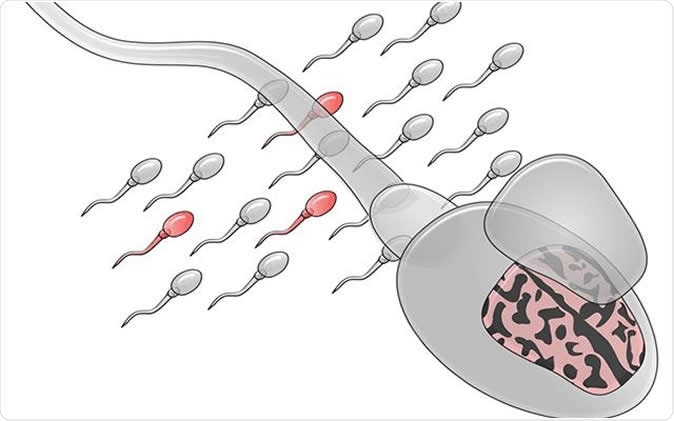Autism is part of a spectrum of conditions called the autistic spectrum disorders (ASD). They begin in childhood and may last even in adulthood. Some of the prominent features of ASD include problems with social interactions difficulty in understanding and empathizing with others, problems with communication skills and language and unusual patterns of behaviour and thought patterns such as repetitive movements, behaviours etc. Children with ASD may become upset if their normal routines are altered or when they are exposed to too many external stimuli.

Illustration of sperm mosaicism, mutated sperm are depicted in red. Credit: UC San Diego Health Sciences
As of now the cause or pathology behind these conditions is not well understood. Some researchers believe that environment as well genetics could play a role in causation of this condition. Some children may develop mutations that are not inherited and not seen in the parents but occur de novo in the child. This new study reveals that there may be certain mutations detectable in the sperms of the fathers that may raise the risk of autism in the child.
Researchers from University of California San Diego School of Medicine as well as from other institutes worked together to work on measurement of mutations in the sperms of the fathers. They described a method to measure the mutations causing disease only in the sperms of the fathers that could raise risk of ASD in the offspring.
One of the senior authors of the study, Jonathan Sebat, professor and chief of the BeysterCenter for Molecular Genomics of Neuropsychiatric Diseases at UC San Diego School of Medicine, in a statement said, “Autism afflicts 1 in 59 children and we know that a significant portion is caused by these de novo DNA mutations, yet we are still blind to when and where these mutations will occur. With our new study, we can trace some of these mutations back to the father, and we can directly assess the risk of these same mutations occurring again in future children.”
The team explained that some of the de novo mutations are seen in 10 to 30 percent of children with ASD. These mutations were found to have gone up with the rising age of the father. In fact there have been numerous studies linking paternal age and risk of autism. The team added that these de novo mutations are usually noted in sperms and eggs of the parents. They start and occur spontaneously with no inheritance from either parents. During fertilization of the egg and the sperm, a de novo mutation may appear and this is then carried forth in the fertilized egg and finally to the baby. Researchers explained that several studies reveal that paternal sperms are more common causes of these de novo mutations compared to maternal eggs. The chance of such mutations recurring in the same family over different generations is 1 to 3 percent, they wrote.
One of the senior authors of the study Joseph Gleeson, Rady Professor of Neuroscience at UC San Diego School of Medicine and director of neuroscience research at the Rady Children's Institute for Genomic Medicine, said in a statement, “However, such estimates are not based on actual knowledge of the risk in an individual family, but instead are based on frequencies in the general population. When a disease-causing mutation occurs for the first time in a family, the probability that it could happen again in future offspring is not known. Thus families must make a decision with a great deal of uncertainty.”
To understand the predictability of such mutations and ASD in future offspring, the international team looked at the sperm samples of eight fathers with children diagnosed with ASD. The team explained a term mosaicism where same individual carries cells that may have different genetic makeup. The aim of their study was to assess the presence of mosaicism in the same person. They performed deep whole genome sequencing and noted that some of the genetic variants seen in persons with ASD carried genes that matched the genes in the father’s sperm only.
First author of the study, Martin Breuss, an assistant project scientist in Gleeson's lab said in his statements explaining, “While medical textbooks teach us that every cell in the body has an identical copy of DNA, this is fundamentally not correct. Mutations occur every time a cell divides, so no two cells in the body are genetically identical. Mosaicism can cause cancer or can be silent in the body. If a mutation occurs early in development, then it will be shared by many cells within the body. But if a mutation happens just in sperm, then it can show up in a future child but not cause any disease in the father.” They found that these mutations that could mean future disease were seen in 15 percent of the paternal sperms and were undetectable if the blood samples of the same fathers were examined or genotypes.
Gleeson said in conclusion, “My laboratory has a long-standing interest in understanding the origins of pediatric brain disease, and how mutations contributes to disease in a child. We previously showed that mosaicism in a child can lead to diseases like epilepsy. Here, we show that mosaicism in one of parents is at least as important when thinking about genetic counselling.” The team hoped that this study would open diagnostic tests which could help detect risk of ASD in offspring by genotyping and measuring the risk in paternal sperm.
Journal reference:
Breuss, M.W., Antaki, D., George, R.D. et al. Autism risk in offspring can be assessed through quantification of male sperm mosaicism. Nat Med (2019) doi:10.1038/s41591-019-0711-0, https://www.nature.com/articles/s41591-019-0711-0